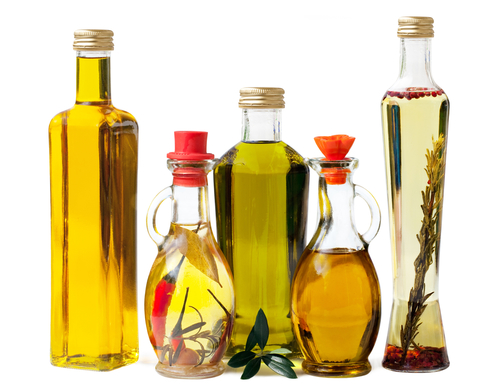Is Canola Oil Bad For You?
Short answer
Cold-pressed canola oil in small amounts and at low cooking temperatures is not particularly bad for you. However, the way in which most canola oil is processed may be hazardous to your health.
Recommended Alternative
A fairly even ratio of beneficial and harmful qualities. Moderation is important. Very general topics that can lean towards both sides of the spectrum will be placed here as well. Rice, for example, can be good or bad depending on the type.
View Full Grading System
Category 'A'
Very healthy and numerous health benefits. Side effects are rare. Things rated an 'A+' are typically necessary for survival (for example, water).
Very healthy and numerous health benefits. A few harmful qualities may be associated, but only under certain circumstances such as an allergic reaction.
Very healthy and numerous health benefits. Harmful qualities may be associated, but aren't usually serious.
It is important to note that even the best things in life can become bad in immoderate amounts. So, although something may be rated an 'A+', overconsumption/overdoing can bring unwanted effects.
Category 'B'
Very beneficial to your health. Things rated a 'B+' may have a few harmful qualities to pay attention to.
Overall beneficial to your health. Things rated a 'B' may have some harmful qualities to pay attention to.
More beneficial to your health than not. However, harmful qualities are most likely associated and shouldn't be overlooked.
The main difference between category 'A' and category 'B' is the harmful qualities typically present in 'B' items. Serious side effects are usually uncommon, but are still possible and should be taken note of.
Category 'C'
Both beneficial and harmful qualities associated. Things rated a 'C+' are typically a bit more on the beneficial side. Still, moderation is important.
A fairly even ratio of beneficial and harmful qualities. Moderation is important. Very general topics that can lean towards both sides of the spectrum will be placed here as well. Rice, for example, can be good or bad depending on the type.
More harmful than beneficial. Side effects are common, especially when consumed/done excessively. Moderation is very important.
Category 'C' usually denotes to both good and bad qualities. When it comes to this category, it is important to keep this word in mind: moderation.
Category 'D'
Harmful to your health. Although benefits may be associated, the bad most likely outweighs the good. Moderation is very important.
Harmful to your health. A few benefits may be associated, but the bad outweighs the good. Moderation is extremely important.
Harmful to your health. Very few, if any, benefits are present. Things in this category should be avoided as much as possible.
Category 'D' is typically for things that are more harmful than beneficial. While consuming/doing something unhealthy once in a blue moon shouldn't hurt, we definitely recommend eliminating 'D' items as a regular part of your routine/diet.
Category 'F'
Category 'F' is for things that fail to bring anything beneficial to the table, and are very harmful to your health. We recommend completely avoiding anything in this category. Long-term side effects of 'F' items are usually very serious.
Category 'N'
'N' stands for neutral. Things placed into this category are generally (a) neither good nor bad for you, or (b) lack the necessary evidence to reach any conclusions.
Long answer
Canola oil is a variety of vegetable oil extracted from a particular type of rapeseed. The name canola comes from CANadian OLA (meaning "oil") as a tribute to the Canadian scientists who first made it. Canola oil, like other vegetable oils, contains polyunsaturated fats such as omega-3 and omega-6 fatty acids that may impart some health benefits, particularly to the brain and heart. However, because of the chemical processing most canola and other vegetable oils undergo, the ratio of omega-6 to omega-3 fatty acids is much higher than the body can efficiently process. This means that while omega-6 and omega-3 fatty acids are both essential to proper brain and heart functions, the excessively high levels of omega-6 fatty acids in canola oil can actually contribute to brain damage, heart disease, and changes in cell membrane structure all over the body.
Another potential problem with canola oil is that most rapeseed used in its production (at least in North America) have been genetically modified to be resistant to weed-killers and pesticides commonly used on crops. While cold-pressed and organic canola oils are available, the vast majority have been processed at high temperatures using hexane as a method of extraction, a process which significantly raises the levels of oxidized fats and trans fats. Both genetic modification of crops and chemical oil extraction are fairly new processes, developed in response to a consumer demand for less-expensive products. Because humans have just started adding genetically modified food and chemically extracted oils to their regular diets in the last 100 years or so, researchers can't be sure of all the risks associated with them.
Organic, cold-pressed canola oil is okay in moderation when used at low cooking temperatures. Canola oil isn't safe for use at high cooking temperatures, and processed, chemically treated varieties are more likely to be dangerous.
Possible long-term side effects
- cardiovascular disease
- brain damage
- cell damage
Ingredients to be aware of
Healthier alternatives
- cold-pressed canola oil
-
extra virgin olive oil
-
avocado oil
Our Wellness Pick
(what is this?)
La Tourangelle Canola Oil
- Organic certified
- Non-GMO seeds
- Chemical-free oil
- High heat stable
- Neutral flavor
Learn More!
Please turn your Ad Blocker off to see this content. Thank you!
Thank you for your feedback!
Written by Leah Bolton
Published on: 01-28-2016
Last updated: 12-15-2023
Thank you for your feedback!
Written by Leah Bolton
Published on: 01-28-2016
Last updated: 12-15-2023

 Approved by
Approved by 















